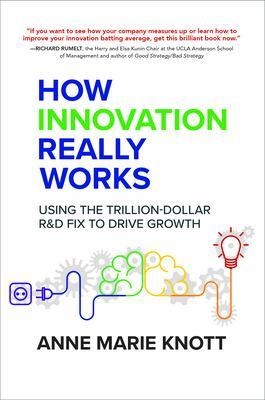
How Innovation Really Works: Using the Trillion-Dollar R&D Fix to Drive Growth
McGraw-Hill Education (Verlag)
978-1-259-86093-5 (ISBN)
An essential guide to determining which R&D investments are most likely to drive growth, increase profits, and produce innovative products
Your company is spending millions on R&D every year, but despite your best efforts, that R&D isn’t driving growth. There’s a reason for that. If you’re like 95% of firms, you aren’t investing right amount, and the productivity of your R&D has fallen dramatically over the past several years.
How is this possible? You read all the innovation articles, and hire the top consultants. The problem is no one (including the authors and consultants) know if their prescriptions are valid, because there aren’t good measures of R&D to test them.
Using a new measure, called Research Quotient (RQ), professor Anne Marie Knott tests many of the most popular innovation prescriptions using proprietary data from National Science Foundation (NSF) surveys of company R&D practices. The results are startling. Many of the most popular prescriptions don’t work. Not only do they fail to improve innovation, in many cases they actually make firms worse! Thus the popular prescriptions are actually contributing to the decline in firm innovativeness.
RQ changes that by offering a “Sabremetrics for R&D”. Just as Sabremetrics improved the productivity of baseball teams, the hope for RQ is it will reverse the decline in companies’ R&D productivity. How Innovation Really Works will show you how. It provides actionable information to increase companies’ market value in the short run through wiser R&D investment and to increase it over the long run through better R&D practices. While this prospect should be promising to managers and shareholders, it has even broader implications. Because R&D productivity drives economic growth, reversing the decline in firm innovativeness has the potential to restore economic growth as well.
Dr. Anne Marie Knott is Professor of Strategy at Washington University, where her principle area of research is innovation. This interest stems from an earlier career as an R&D project manager at Hughes Aircraft. Her work has been published in Management Science, Organization Science, Strategic Management Journal, Small Business Economics, and the Harvard Business Review. She is the author of Venture Design.
Preface
Acknowledgments
Chapter 1: The Problem: Flying Blind
Chapter 2: Misconception 1: Small Companies Are More Innovative
Chapter 3: Misconception 2: Uncontested Markets Are Good for Innovation
Chapter 4: Misconception 3: Spending More on R&D Increases Innovation
Chapter 5: Misconception 4: Companies Need More Radical Innovation
Chapter 6: Misconception 5: Open Innovation Turbocharges R&D
Chapter 7: Misconception 6: R&D Needs to Be More Relevant
Chapter 8: Misconception 7: Wall Street Rewards Innovation
Chapter 9: The Promise of RQ: Restoring Growth
Chapter 10: Behind RQ: What It Really Is and How to Find Yours
Appendix
Notes
Index
| Erscheinungsdatum | 20.03.2017 |
|---|---|
| Zusatzinfo | 20 Illustrations |
| Verlagsort | OH |
| Sprache | englisch |
| Maße | 155 x 234 mm |
| Gewicht | 537 g |
| Themenwelt | Wirtschaft ► Betriebswirtschaft / Management ► Unternehmensführung / Management |
| Wirtschaft ► Volkswirtschaftslehre ► Ökonometrie | |
| ISBN-10 | 1-259-86093-0 / 1259860930 |
| ISBN-13 | 978-1-259-86093-5 / 9781259860935 |
| Zustand | Neuware |
| Haben Sie eine Frage zum Produkt? |
aus dem Bereich


